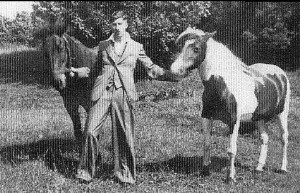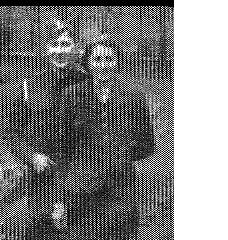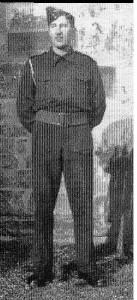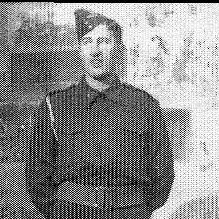By Michael Whiteman
As a young fellow from 1936 onward I was working as an under-gardener at Leasam House, Playden, Near Rye. I really enjoyed this work and each Friday morning I used to harness up the black pony onto a buggy trap, going into Rye High Street, to a greengrocers with any surplus vegetables, tomatoes and lettuce that was going at the time and come autumn 1938 the Government stated that all men who were twenty years old would be compelled to either the T.A. for weekend training or join the forces the following spring for six months training plus two weeks further training yearly. This I decided to do myself. If war was going to happen, I would be in it anyway. We would be known as Millitia Boys.

So in June 1939, I joined the R.A./Search Light training camp at Norton Manor, just outside Taunton, Somerset. There were four batteries under canvas, old bell tents which were inclined to leak when it rained and it was rather wet to start with. There was no parade ground made as yet so we were marched around the lanes to doddering and rifle training. September 3rd when war started, we had done a lot of Search Light work with planes at night and we passed out completing our training. I had become an S.L.O (Search Light Officer) which involved the electric side of the light itself. Home for Christmas leave. On going back a number of us were sent to North Wales to Kenmel Park camp near Rhyll. Here we formed two batteries with T.A. personnel from London. We should have gone to France in early February, but a number of us and myself went down with German Measles. So embarkation leave wasn’t until late February. So first of March we got to France and to St. Omer. I was in B Troop 1st Battery, 1st Reg R.A. We took over from the Royal Engineers who were previously in charge of Search Lights. The lights were quite new also with the new sound locator and a large one on a platform and four wheels for towing by the lorry which was an old one brought up from Egypt. We were spaced out along the Belgium border two to three miles apart, ten men to a light, one of whom was an N.C.O. The lorry driver ran the engine for the light, it being 300 yards away with a lead cable from the lorry to the light. We were at the town of Tourcoing right on the Belgium border. A French machine gun nest was only 200 yds away from our light. When they fired, by golly, didn’t it rattle.
They did down one plane while we were at the spot. We were there until just after the Germans started to break through. I remember one night just before we moved, the guard in the middle of the night called us all out, he had heard movement at the bottom of the field where a canal ran along – it was the border for Belgium. Yes we could hear something, so in open order with rifles at the ready we advanced down to the canal soon to find some cows had been put in the field after dark. They were pulling at the long grass and snuffling as they do when eating. After cursing our mate for waking us up, we went back to get our rest. Around the 1st May we were ordered to pack everything and our battery was put along the La Bassee canal on guard duties. There seemed a lot of troop movement coming back over the canal, but we knew nothing of what was happening. About a week later, we were all withdrawn back to Calais, where we ringed the whole of the outer town about two miles out. My detachment was on the Eastern Dunkirk side – nearest the sea, roughly one and a half miles further on near a little farm.

We set up our light and were ready for what we did not know. The first few nights virtually quiet and then all hell broke loose. The ten of us were so dead beat that we were all running the light with five men, the other five for the other half, it was working OK this way too. Then Tuesday May 21st at night it started, a terrific shelling and gunfire fight. I’ve never seen fireworks like it before. 22nd and 23rd night and day, all we could do was listen to it all. We had no communication with our HQ so early 24th we packed everything into our lorry and went to find our next detachment which was at the little Aerodrome I should think three miles from Calais. We found our mates cooking eggs they had acquired from the farm close by. Two of us were returning from the loo which was in the main buildings of the airport when a row of German tanks broke out of trees at the far end of the runway. What could two detachments do against tanks, with only six rifles, two Bren guns and two pistols with only a little ammo. The light on the ground was quickly broken, we loaded ourselves into the two lorries and as we took off along the road into Calais, the bullets were going through the canvas of our trucks with us laying on the floor. I often wonder what happened to the eggs which were left cooking on the fire. Half way to Calais we came to a few French and our own KRR fellows. Our big sound locator was left to help a road block. A French soldier passed round a couple of bottles of Cognac and one of our lads milked a cow in a nearby field, the milk was also being passed round and after a little while we started our run into Calais.

We were sent to a rest area, where we had a drink of tea and fruit juice. This was about midday. We left our lorries with others which I believe were afterwards blown up and destroyed. A dozen of us were taken down the town over the main bridge of the outer canal and stationed in houses looking into the town. We had our rifles but only a few rounds of ammo each. Later that evening we were taken back towards the docks where we were put into an empty grocer’s shop. We stopped the night here. All we could find to eat was packets of sugar lumps which we sucked slowly. The night was a bit noisy way up. Nothing our way till after light showed when shelling started again. Five lads ran into the block opposite when a shell landed right onto it. Only two ran out after. We thought it time for us to move out. We made out way slowly to the dock area on the east side. The railway runs right down to where the boats come in. A Red Cross train was standing there. Must have come in earlier with wounded who got away on the last boat out. The dead were laying neatly in a long row along the platform. Saturday night I spent with a young RB lad 18 yrs old by the goods trucks standing on the other side of the platform. We went through several cases left by fleeting civvies on earlier boats. Found 2 boxes of chocs and 2 small bottles of champers which we slowly had during the night. Remember my last real meal was Friday morning early. I didn’t even feel drunk, probably took it slowly, planes were droning all night, sometimes dropping off a few bombs. A creeping barrage had started by the Germans from all sides with our battleships shelling from the sea. Suddenly a terrific flash and bang. I rolled under the Red Cross train with it rocking on top of me. Then all quiet. I got out on the other side and saw a young Lft K.R.R. on the ground moaning. I went to him, got him to his feet and managed to get him to the other side of the platform. The left side of his head and shoulder was bleeding, soaking my uniform down my right side. As he collapsed, two of our orderlies arrived to sort him out. He had a message in his water bottle for H.Q. which was on the pier close by.
By this time, others were coming by shouting “come this way”. I followed as we went into the sand dunes, shells were falling behind us. Planes in tens were coming down the coast line turning at the pier and bombing the town we’d just left. We fired at them with our rifles. Some of them strafed us so we got into the dunes again. Three Hurricanes came over from Dover and had a fight, one German came down in the sea with a parachute, two of ours were downed, one in the sea, one on the shore line and exploded. One Hurricane went back to Dover. Four of us in the sand dunes put our rifles over a ledge as we heard talking, thinking they were Germans. They were, they had our lads walking in from of them, our lads shouted don’t shoot. It was all over for us. Churchill said we were to stop there to the end. No evacuation. It was to keep the Germans from getting to Dunkirk so our troops could get away. Time was 1 o” clock on Sunday 26 May and so having nothing to eat really from Friday in the morning at 6 o’ clock we were herded along the sand back towards the town. As we slowly made our way back, we passed the lads still laying on the platform, also a few on the bank opposite, one poor fellow with his head off, it was resting under his arm, another lad with his tummy open and still moving with his nervous system not yet stopped. Another kneeling by a wall the Bren gun still held in his hands.
To be continued
